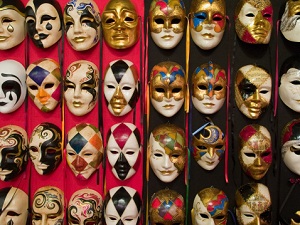Mood
 A mood is an emotional state that may last anywhere from a few minutes to several weeks. Mood affects the way people respond to stimuli. For example, a depressed mood creates a bias in favor of responding negatively, whereas a manic mood makes it more likely that a person will respond energetically. Moods are different from emotions in that they are not necessarily caused by anything. For example, a person may feel the emotion of happiness after getting married or receiving a gift, while a happy mood is a disposition to react happily toward external stimuli. Moods tend to last longer than emotions.
A mood is an emotional state that may last anywhere from a few minutes to several weeks. Mood affects the way people respond to stimuli. For example, a depressed mood creates a bias in favor of responding negatively, whereas a manic mood makes it more likely that a person will respond energetically. Moods are different from emotions in that they are not necessarily caused by anything. For example, a person may feel the emotion of happiness after getting married or receiving a gift, while a happy mood is a disposition to react happily toward external stimuli. Moods tend to last longer than emotions.
Are Mood and Personality the Same Thing?
Moods differ from personality primarily in that they are less static than personality–they tend to change more. Although moods can last for an extended period of time, personality tends to be longer-lasting. However, personality and mood do affect one another. People with optimistic personalities are more likely to display an upbeat, happy mood. People with pessimistic or insecure personality traits may be more likely to exhibit a depressed mood.
What are Mood Disorders?
Mood disorders are psychiatric conditions characterized by ongoing mood regulation problems. Examples of mood disorders listed in the DSM-IV include:
Also, substance-induced mood disorder is a chronic disregulation of mood caused by substance use. It frequently causes depressive, psychotic, or manic symptoms.
What Affects Mood?
Sleep is a major contributing factor to mood, and people suffering from lack of sleep are more likely to have depressed moods. Diet, medication, and other lifestyle factors can also affect mood. Several studies have demonstrated that decision-making is affected by mood. Mood can also affect how people view persuasive content such as advertising. For example, a person in an upbeat mood might respond well to highly energetic advertising campaigns.
References:
- American Psychological Association. APA concise dictionary of psychology. Washington, DC: American Psychological Association, 2009. Print.
- Colman, A. M. (2006). Oxford dictionary of psychology. New York, NY: Oxford University Press.
Last Updated: 08-12-2015
- 5 comments
- Leave a Comment
Mickayla f
January 17th, 2017 at 3:30 PMMood make me sometimes happy
Joanne
September 11th, 2017 at 4:55 PMYes I do have Depression and Anxiety it can be bad at times but I Coup with it
ZZ
December 1st, 2019 at 7:11 AMI think this warrants and needs much more explanation. Jumping to “mood disorders” which are clearly clinical, or hazardous is a huge jump, and a disservice to what you’ve said previously. What influences mood? How does it relate to negative entropy? Or loneliness? There are causes to mood, such as poor quality sleep, stress, loneliness, quality of life/how one lives/rewards in living and lack thereof… these are somewhat tangible things, unlike organic imbalances that are beyond control. The influence of parents is particularly strong here. But it may also be cultural. There are peoples who tend to have a certain outlook on things, negative or “positive.” One has to understand their cultural context. In that respect, much therapy can be damaging by ignoring that factor, by expecting the wrong things of people.
Leave a Comment
By commenting you acknowledge acceptance of GoodTherapy.org's Terms and Conditions of Use.



